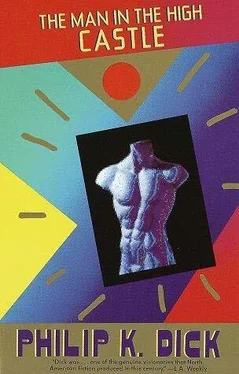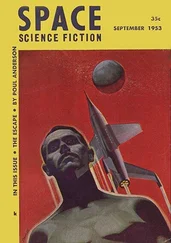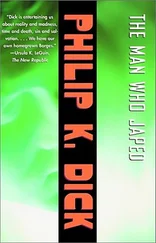Could it be the wrong Abendsen? She had gotten the address from the Cheyenne phone book, but it matched the number she had called the night before from Greeley.
She stepped up onto the porch with its wrought-iron railings and pressed the buzzer. Through the half-open door she could make out the living room, a number of persons standing about, Venetian blinds on the windows, a piano, fireplace, bookcases… nicely furnished, she thought. A party going on? But they were not formally dressed.
A boy, tousled, about thirteen, wearing a T-shirt and jeans, flung the door wide. “Yes?”
She said, “Is—Mr. Abendsen home? Is he busy?”
Speaking to someone behind him in the house, the boy called, “Mom, she wants to see Dad.”
Beside the boy appeared a woman with reddish-brown hair, possibly thirty-five, with strong, unwinking gray eyes and a smile so thoroughly competent and remorseless that Juliana knew she was facing Caroline Abendsen.
“I called last night,” Juliana said.
“Oh yes of course.” Her smile increased. She had perfect white regular teeth; Irish, Juliana decided. Only Irish blood could give that jawline such femininity. “Let me take your purse and coat. This is a very good time for you; these are a few friends. What a lovely dress… it’s House of Cherubini, isn’t it?” She led Juliana across the living room, to a bedroom where she laid Juliana’s things with the others on the bed. “My husband is around somewhere. Look for a tall man with glasses, drinking an old-fashioned.” The intelligent light in her eyes poured out to Juliana; her lips quivered—there is so much understood between us, Juliana realized. Isn’t that amazing?
“I drove a long way,” Juliana said.
“Yes, you did. Now I see him.” Caroline Abendsen guided her back into the living room, toward a group of men. “Dear,” she called, “come over here. This is one of your readers who is very anxious to say a few words to you.”
One man of the group moved, detached and approached carrying his drink. Juliana saw an immensely tall man with black curly hair; his skin, too, was dark, and his eyes seemed purple or brown, very softly colored behind his glasses. He wore a hand-tailored, expensive, natural fiber suit, perhaps English wool; the suit augmented his wide robust shoulders with no lines of its own. In all her life she had never seen a suit quite like it; she found herself staring in fascination.
Caroline said, “Mrs. Frink drove all the way up from Canon City, Colorado, just to talk to you about Grasshopper .”
“I thought you lived in a fortress,” Juliana said. Bending to regard her, Hawthorne Abendsen smiled a meditative smile. “Yes, we did. But we had to get up to it in an elevator and I developed a phobia. I was pretty drunk when I got the phobia but as I recall it, and they tell it, I refused to stand up in it because I said that the elevator cable was being hauled up by Jesus Christ, and we were going all the way. And I was determined not to stand.”
She did not understand.
Caroline explained, “Hawth has said as long as I’ve known him that when he finally sees Christ he is going to sit down; he’s not going to stand.”
The hymn, Juliana remembered. “So you gave up the High Castle and moved back into town,” she said.
“I’d like to pour you a drink,” Hawthorne said.
“All right,” she said. “But not an old-fashioned.” She had already got a glimpse of the sideboard with several bottles of whiskey on it, hors d’oeuvres, glasses, ice, mixer, cherries and orange slices. She walked toward it, Abendsen accompanying her. “Just I. W. Harper over ice,” she said. “I always enjoy that. Do you know the oracle?”
“No,” Hawthorne said, as he fixed her drink for her.
Astounded, she said, “ The Book of Changes ?”
“I don’t, no,” he repeated. He handed her her drink.
Caroline Abendsen said, “Don’t tease her.”
“I read your book,” Juliana said. “In fact I finished it this evening. How did you know all that, about the other world you wrote about?”
Hawthorne said nothing; he rubbed his knuckle against his upper lip, staring past her and frowning.
“Did you use the oracle?” Juliana said.
Hawthorne glanced at her.
“I don’t want you to kid or joke,” Juliana said. “Tell me without making something witty out of it.”
Chewing his lip, Hawthorne gazed down at the floor; he wrapped his arms about himself, rocked back and forth on his heels. The others in the room nearby had become silent, and Juliana noticed that their manner had changed. They were not happy, now, because of what she had said. But she did not try to take it back or disguise it; she did not pretend. It was too important. And she had come too far and done too much to accept anything less than the truth from him.
“That’s—a hard question to answer,” Abendsen said finally.
“No it isn’t,” Juliana said.
Now everyone in the room had become silent; they all watched Juliana standing with Caroline and Hawthorne Abendsen.
“I’m sorry,” Abendsen said, “I can’t answer right away. You’ll have to accept that.”
“Then why did you write the book?” Juliana said.
Indicating with his drink glass, Abendsen said, “What’s that pin on your dress do? Ward off dangerous anima-spirits of the immutable world? Or does it just hold everything together?”
“Why do you change the subject?” Juliana said. “Evading what I asked you, and making a pointless remark like that? It’s childish.”
Hawthorne Abendsen said, “Everyone has—technical secrets. You have yours; I have mine. You should read my book and accept it on face value, just as I accept what I see—” Again he pointed at her with his glass. “Without inquiring if it’s genuine underneath, there, or done with wires and staves and foam-rubber padding. Isn’t that part of trusting in the nature of people and what you see in general?” He seemed, she thought, irritable and flustered now, no longer polite, no longer a host. And Caroline, she noticed out of the corner of her eye, had an expression of tense exasperation; her lips were pressed together and she had stopped smiling entirely.
“In your book,” Juliana said, “you showed that there’s a way out. Isn’t that what you meant?”
“Out,” he echoed ironically.
Juliana said, “You’ve done a lot for me; now I can see there’s nothing to be afraid of, nothing to want or hate or avoid, here, or run from. Or pursue.”
He faced her, jiggling his glass, studying her. “There’s a great deal in this world worth the candle, in my opinion.”
“I understand what’s going on in your mind,” Juliana said. To her it was the old and familiar expression on a man’s face, but it did not upset her to see it here. She no longer felt as she once had. “The Gestapo file said you’re attracted to women like me.”
Abendsen, with only the slightest change of expression, said, “There hasn’t been a Gestapo since 1947.”
“The SD, then, or whatever it is.”
“Would you explain?” Caroline said in a brisk voice.
“I want to,” Juliana said. “I drove up to Denver with one of them. They’re going to show up here eventually. You should go some place they can’t find you, instead of holding open house here like this, letting anyone walk in, the way I did. The next one who rides up here—there won’t be anyone like me to put a stop to him.”
“You say ‘the next one,’ “ Abendsen said, after a pause. “What became of the one you rode up to Denver with? Why won’t he show up here?”
She said, “I cut his throat.”
“That’s quite something.” Hawthorne said. “To have a girl tell you that, a girl you never saw before in your life.”
Читать дальше










